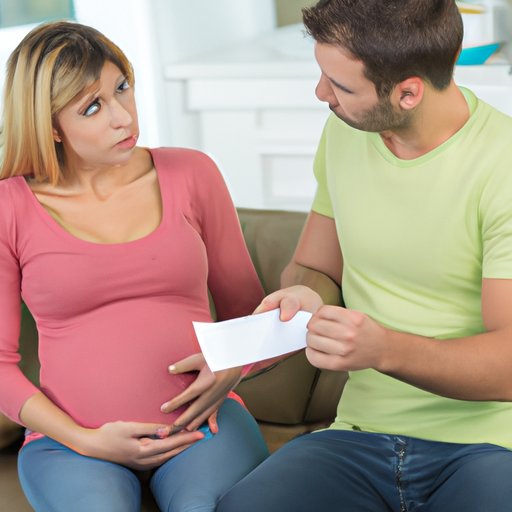Introduction
Pregnancy is a period of time when an embryo or fetus develops inside a woman’s uterus. It typically lasts 40 weeks, beginning from the first day of the woman’s last menstrual period. This article provides a comprehensive guide on how to know if you are pregnant, including how to take a home pregnancy test, notice changes in your body, track your menstrual cycle, pay attention to shifts in your hormones, and visit your doctor for a blood or urine test.

Take a Home Pregnancy Test
The most common way to determine if you are pregnant is to take a home pregnancy test. These tests usually measure the amount of human chorionic gonadotropin (hCG) in your urine. hCG is a hormone produced by the placenta after implantation. Most home pregnancy tests are 99% accurate if used correctly and according to the instructions.
When should you take the test? Generally, it is best to wait until your period is late before taking a home pregnancy test. However, some tests are sensitive enough to detect hCG as early as 7-10 days past ovulation. It is important to read the instructions carefully and follow them exactly.
There are several types of home pregnancy tests available. Some tests require that you collect a sample of your urine in a cup, while others allow you to simply pee directly onto the testing stick. Some tests also require that you wait several minutes for the results, while others provide results within one minute.
Once you have taken the test, it is important to read the results accurately. Most tests will show a “+” sign if you are pregnant, and a “-” sign if you are not pregnant. It is important to check the expiration date on the package and to make sure the test has not been exposed to too much moisture or heat.

Notice Changes in Your Body
If you suspect that you might be pregnant, it is important to pay close attention to any changes in your body. Early signs of pregnancy can vary from person to person, but some of the most common signs include nausea, fatigue, and breast tenderness.
Nausea, sometimes called morning sickness, is one of the earliest signs of pregnancy. It is usually caused by hormonal changes in the body and can range from mild to severe. It is important to remember that not all women experience nausea during pregnancy.
Fatigue is another common symptom of pregnancy. This can be caused by the additional energy needed to support the growing baby, as well as hormonal changes in the body. It is important to get plenty of rest and to listen to your body’s needs.
Breast tenderness is another symptom that many women experience during early pregnancy. This is caused by increased levels of hormones in the body and can range from mild to severe. It is important to wear a supportive bra to help reduce discomfort.
Track Your Menstrual Cycle
Tracking your menstrual cycle is another way to determine if you are pregnant. Missing a period can be an indication of pregnancy, although other factors such as stress or illness can also cause a missed period. If you miss your period and think you might be pregnant, it is important to take a home pregnancy test.
It is also important to look for signs of implantation bleeding. This is light spotting that occurs when the fertilized egg implants in the uterus. It usually occurs 6-12 days after conception and can last anywhere from a few hours to a few days. It is important to note that not all women experience implantation bleeding.
Pay Attention to Shifts in Your Hormones
During pregnancy, your body produces higher levels of certain hormones such as estrogen and progesterone. These hormones are responsible for many of the physical and emotional changes that occur during pregnancy. It is important to pay attention to these shifts in your hormones.
Common symptoms of hormonal shifts include mood swings, food cravings, increased sensitivity to smells, and changes in libido. It is important to speak with your doctor if you are experiencing any of these symptoms, as they may indicate a medical condition.

Visit Your Doctor For a Blood or Urine Test
If you think you are pregnant, it is important to visit your doctor for a blood or urine test. These tests are more accurate than home pregnancy tests and can detect hCG earlier in the pregnancy. The blood test can detect hCG as early as 11 days after conception, while the urine test can detect it as early as 14 days after conception.
It is important to prepare for these tests. Your doctor may ask you to fast before the test, and you may also need to provide a urine sample. It is also important to tell your doctor about any medications you are taking, as this may affect the results.
Conclusion
This article provided a comprehensive guide on how to know if you are pregnant. It discussed how to take a home pregnancy test, notice changes in your body, track your menstrual cycle, pay attention to shifts in your hormones, and visit your doctor for a blood or urine test. If you think you might be pregnant, it is important to seek help and support from your healthcare provider.
(Note: Is this article not meeting your expectations? Do you have knowledge or insights to share? Unlock new opportunities and expand your reach by joining our authors team. Click Registration to join us and share your expertise with our readers.)
